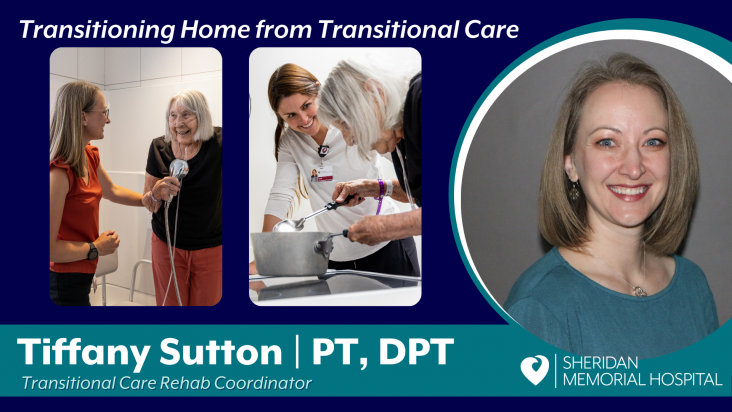By Tiffany Sutton, PT, DPT, TCU Rehabilitation Coordinator at Sheridan Memorial Hospital
From changes to one’s daily schedule to the adjustments necessary to return home – Sheridan Memorial Hospital’s transitional care team of nurses, doctors, and therapists manage transitions and help you or your family member regain a level of independence for a safe return home following an injury, surgery, or serious illness. From daily rehabilitation to 24/7 nursing care, our multi-disciplinary team will work to keep you close to your community, friends, family, and the one place we plan to transition back to – home. After varying lengths of stay, patients are headed home, but how do we prepare them? Two invaluable tools our Transitional Care Team takes advantage of are our newly improved ADL Suite and Home Evaluations.
Activities for Daily Living Suite
Sheridan Memorial Hospital’s ADL (Activities for Daily Living) Suite is set up to emulate a home environment with a kitchen and bathroom where patients can practice skills before returning home. Simple tasks such as reaching for clothes in their closet, preparing a meal using various appliances, and taking a shower are practiced in our home-like suite with our care team’s guidance.
Completing sessions within the ADL Suite under the team’s guidance allows for “failure” in a safe environment. By putting our patients in real-life scenarios in a safe, controlled setting, we can motivate them toward their goals while quickly making modifications. Being in a hospital for an extended period can create a new set of habits because patients become used to delivered meals, showers without tubs, and a schedule made for them. The time with our therapy team in the suite allows one to better prepare for the transition back into their daily life and decision-making.
Tasks within ADL sessions allow for a collaborative and efficient approach among therapists. Cooking a patient’s favorite dish is one of the most common activities between therapist and patient, as it allows for observation of occupational, physical, and speech therapy progress. For example, physical therapists review one’s ability to stand at the stove and their overall balance and stability, occupational therapists watch for their ability to reach and turn things on/off, and speech therapists observe the ability to follow a recipe and swallow the food one makes.
Home Evaluations
The home evaluation is an invaluable tool for our team to ensure a safe and triumphant return to their living situation. The key to a successful transition is the personalization our team focuses on for each patient, their diagnosis, rehabilitation, and home environment. A vital part of patient care is meeting them where they’re at and keeping them safe. Sheridan Memorial Hospital prioritizes the home evaluation and is one of the few transitional care facilities in the area that takes the time to travel to the home with our patients to ensure it is in the best shape to transition back into the space.
A home evaluation isn’t a judgment of cleanliness or décor choices. This time is for a rehab therapist to evaluate the setup, the patient performing tasks, and their mobility throughout the home. This exercise helps to dispel the misconception that “when I go home, I will be able to do ______.” It presents a realistic picture of current levels of functioning and goal setting. A home evaluation is also a time for family members to learn about the adjustments needing to be made in the home, based on what is most important to our patients or additional services that might be required to provide proper care moving forward.
From simple adjustments like moving a rug and furniture which allows space for a walker to navigating life with a beloved pet that can be a tripping hazard, evaluations provide insight to the care team on how to serve our patients best. Home evaluations also decrease quick returns to TCU by eliminating dangers and determining issues a person might have when returning home.
Along with the visit within the home, there are discussions about daily living and the patient’s need for additional support. For patients who are alone in the home or only have a support system from afar, our team will familiarize them with community resources that specialize in providing these services. Home Care, Grocery Delivery, Goose Creek Transportation, and Home Delivered Meals through The Hub are just a few of the services our team familiarizes patients with, ensuring they’re able to return to a safe and fulfilling home life.
The newly improved ADL Suite, along with the many other amenities of the Transitional Care Expansion, will allow for enhanced care and even stronger transitions home for our patients. Our care team is looking forward to transitioning into the newly renovated space on the hospital’s 2nd and 3rd floors in the coming months, providing the opportunity to better serve our growing community with excellent patient-centered care.

